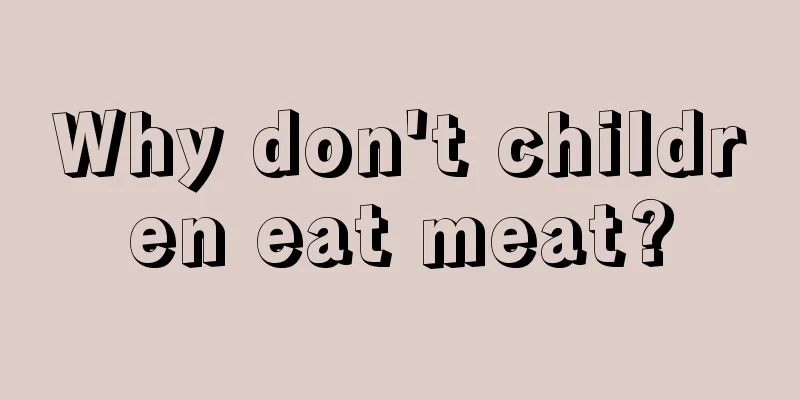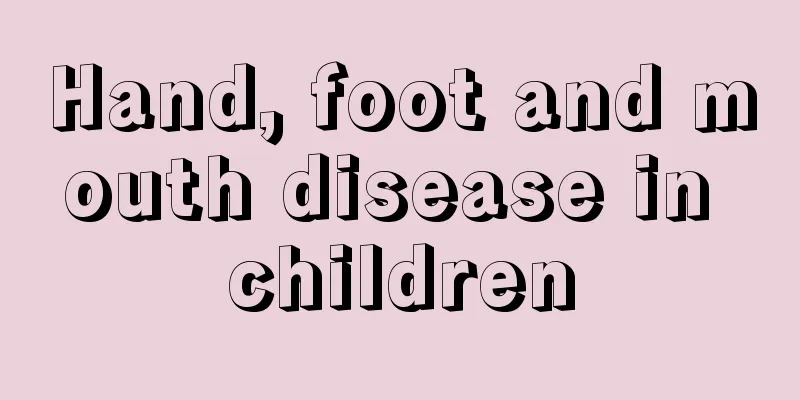Why don't children eat meat?

|
Meat is the main source of protein for our body. For many people, meat is something that must be consumed during the day. But sometimes we find that babies don’t like to eat meat. No matter what the meat is made into, babies don’t like to eat it. For the sake of their children’s health, many parents will think of various ways to solve this problem. So, when you find that your baby doesn’t eat meat, what are the causes and solutions to this situation? Let’s take a look together. 1 Why does my baby not like to eat meat? 1. The meat is not stewed well enough and the meat fibers are coarse. Babies feel that it gets stuck in their teeth and is difficult to chew, so they don’t like to eat meat. This is a relatively common reason for most babies around me. 2. Some babies don’t like to eat greasy food or hate the special taste of certain meats. They will feel nauseous and lose their appetite when they see greasy dishes. 3. It is related to the cooking method of the parents. If the meat is not in good color, texture or taste, the baby may refuse to eat meat. 4. Influenced by parents, who are vegetarians and do not like to eat meat. 2 The importance of eating meat for babies Infants and young children have extremely high requirements for nutrition. There is no period in their lives like the 0-2 years old stage, when they eat very little food but more than double their height and 3-4 times their weight. Babies at this stage have extremely high requirements for the nutritional density of food, especially when they are 6-23 months old. Trace elements such as zinc and iron, vitamins, and proteins all have a vital impact on the baby's developmental potential. Foods of animal origin can effectively provide nutrients such as calcium, iron, zinc, and vitamin A, and are a very good choice for baby food. Foods of animal origin are divided into: meat, eggs, and dairy products (such as milk and dairy products). The absorption rate of iron in red meat is about 25%, which is more than twice the absorption rate of iron in vegetables (10%). Although the meat that babies over 6 months old can consume is not enough to provide all iron needs, the nutritional needs can be maximized by combining it with iron-fortified rice noodles (iron-free rice noodles are not recommended for babies who have just started to add complementary foods) and added vegetables and fruits. 3 The impact of not eating meat on babies Children who do not eat meat soon after adding complementary foods will find it difficult to meet their nutritional needs, especially their iron needs. In food-scarce areas of Africa, the anemia rate among infants and young children is often as high as over 40%, and iron deficiency anemia is the main cause. There is enough research and evidence to show that iron deficiency anemia in infancy is related to the intelligence of children when they grow up. An iron-rich diet is a necessary condition for preventing iron deficiency anemia. WHO predicts that in low-income countries, which tend to eat mainly plant-based foods, more than 2/3 of children in Africa and southeast Asia may suffer from anemia. Conversely, the body's absorption rate will be greatly improved under extreme nutritional conditions, and 1/3 of children will still not be anemic. Maybe your neighbor's child is just lucky, but how do you know that your child is not one of the unlucky 2/3? Adequate nutrition can ensure that more children are not anemic, so why take risks with your child's health? In the United States, nutritional fortification of complementary foods is better. The anemia rate for infants aged 6-13 months is only about 9%, compared with about 20% for infants aged 13 months in China. There is still a lot of room for our popularization and efforts. 4 When does the baby start eating meat? Meat should be introduced as soon as possible when the baby is 6 months old and starts to add complementary foods. Meat here includes eggs, beef, pork, lamb, fish, etc. In the past, there were some older ideas, for example, meat is difficult to digest and should be added after 8 months, or eggs and other foods are prone to allergies and should be eaten after 1 year old. These are all very wrong! Current research has shown that 6-month-old babies can digest meat, it just needs to be pureed. If eggs are added at 6 months, some children may be allergic to them, but this allergy only requires that you stop adding eggs immediately and replace them with other meats. This will not cause any harm to the child in the future or increase the probability of allergies. 5 What to do if your baby doesn’t like to eat meat 1. If your baby is afraid of food getting stuck in his teeth, you can first make the meat into meat paste. Then when making egg custard, stuffing or egg pancakes, mix the meat paste with the child's favorite food, so that the child will eat the meat unknowingly. At the beginning, just mix a small spoonful. After the child can accept it, gradually increase the amount when making some dishes, fried rice, vegetable and meat porridge, small dumplings, egg pancakes, etc., and gradually make the particles thicker. In this way, from less to more, step by step, the child will be able to accept the meat. 2. Parents change the cooking method. If the child does not like red meat, we can give him white meat first, such as shrimp, fish, chicken, etc. After the child feels the aroma of the meat, we can gradually introduce red meat into the child’s diet. 6 Tips for Babies Who Don’t Like Meat 1. If you want your child to have a good appetite, remember not to let your baby eat anything two hours before meals. He can only drink some plain water. Because two hours before meals, especially one hour before meals, even if the child only drinks some yogurt and eats two small biscuits, the child's appetite is very small, and his appetite will be affected when eating. We know that hunger is the best food to go with meals, so if you want your child to feel hungry, then everything he eats will taste delicious. 2. Increase your baby's physical activity. When your child is tired and hungry after climbing a mountain or jumping in the park for an afternoon, you can serve new food to him, and he will eat it with relish. |
<<: What to do if the baby won't eat anything
>>: What should I do if my child hits his chin and has a protrusion on the bone?
Recommend
What to do if the baby's temperature is low after the fever subsides
Children have relatively weak constitutions. Due ...
What fruits are suitable for babies to eat when they have a cold?
The most obvious sign of a baby catching a cold i...
How long is the standard sleep time for a 3-year-old baby?
Sleep is a very important behavior for the human ...
Children get angry and parents get anxious? Have you learned the tricks to relieve the heat?
Every child is a treasure to his or her parents. ...
How long is the appropriate nap time for children?
After a child is born, he or she sleeps for a ver...
Symptoms of neurodevelopmental disorders in children
For children, they will always encounter various ...
What to do if baby has lice in hair
The baby's body is relatively weak and is mor...
Six-month-old baby development standard
In fact, in daily life, we must be very careful t...
What are the consequences of children's tooth decay?
Children's teeth are very critical in the dev...
Nursing of children with elevated platelets
The child's platelet count was elevated and h...
How to treat baby's prickly heat
Babies often get prickly heat in the summer, whic...
How to deal with a child having a fever at night?
Many children often have a fever in the middle of...
What changes occur in baby’s sleep after 100 days?
Sleep is very important for babies who have just ...
How many times a day is normal for a baby to poop?
When the baby defecates, many parents will observ...
What should babies who are allergic to milk eat?
Milk allergy is a gastrointestinal disease that o...









